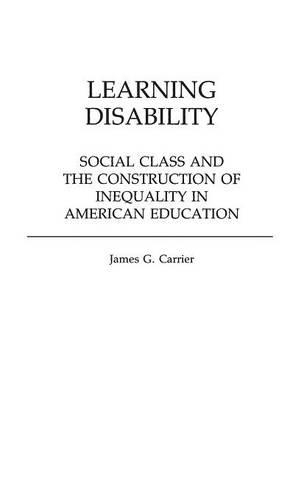
Learning Disability: Social Class and the Construction of Inequality in American Education
(Hardback)
Publishing Details
Learning Disability: Social Class and the Construction of Inequality in American Education
By (Author) James Carrier
Bloomsbury Publishing PLC
Praeger Publishers Inc
16th July 1986
United States
Classifications
Tertiary Education
Non Fiction
Sociology and anthropology
371.9
Physical Properties
Hardback
167
Width 140mm, Height 216mm
340g
Description
This book was written for sociologists concerned with education, but should be read by anyone interested in learning disability as a concept, either from a practical or theoretical standpoint. It is especially recommended for special educators and other professionals concerned with children who experience difficulties in school learning, as well as for the parents of such children. . . . Carrier has written an intelligent, well-documented, and important book that should provoke a great deal of controversy for some time to come. Contemporary Sociology James G. Carrier presents a detailed historical description of the social and educational assumptions integral to the idea of learning disability. Drawing upon the works of leading authorities in the field, Carrier addresses a number of questions from an essentially Marxist perspective. His discussion revolves around the way in which social order structures reality, how that structured reality affects daily social practices, and how this, in turn, perpetuates the social structure which conditioned the practices in the first place. Dividing his discussion into three parts, Carrier first examines the contrast between structure and process in the theory of learning disability espoused by Burke and Boudrieu, moves on to consider the structural approach to the content and meaning of the theory, and finally provides a processualist consideration of why different groups came to support it. Finally, the author presents some of his conclusions about the conflict he has described.
Reviews
Carrier's book greatly enriches the sociological critique of psychometrics and of the role played in schools by cognitive theory.-American Journal of Sociology
"Carrier's book greatly enriches the sociological critique of psychometrics and of the role played in schools by cognitive theory."-American Journal of Sociology
Author Bio
rrier /f James /i G.
